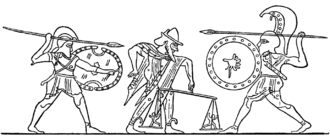Keres
![]()
This article is about the death demons of Greek mythology. For other meanings, see KER.
Ker (Greek Κήρ Kḗr, German 'Tod, Todesgeschick', plural Κῆρες Kḗres, German also Keren) is the personification of violent death in Greek mythology. Sometimes the name is also used for a whole group of demons of death and misfortune.
According to Hesiod, Ker or the Keren were children of Nyx:
Nyx now begat the Ker, the gloomy, Moros, the ghastly,
Thanatos then and the Hypnos at the same time with the swarm of the Oneiren,
[…]
She also gave birth to the Moiren, the cruelly punishing Keren,
Which, of men and gods, sternly pursueth transgressions,
Never, goddesses! rest from the dreadful fury of wrath,
Till she had wreaked her pernicious vengeance on every one that sinned.
So both Ker appears here as a single personification (named together with Moros) and the Keren as a group (together with the Moirs). And in his poem The Shield of Heracles, Hesiod creates a gruesome painting of the doings of the keren:
... But from behind
Keren in dark form, white teeth clashing,
Grass, and dark-eyed, and blood-sprinkled, and aloof,
Had quarrelled about fallers: for every one eagerly wanted
Drinking the black blood; and did she catch a stretched,
Or of fresh wounds that fall, and haste this
She smote the mighty claun; and there went the soul to Aïs,
Deep into Tartarus' shiver: was their heart now
Sated of human blood, back then they threw those,
Turned, and rushed through the field battle noise and tumult.
In Homer, Ker usually appears in a little personalized way as a designation for death or death's doom, in the form of the violent death that snatches life, in contrast to the merciful, gentle Thanatos, related to sleep (Hypnos) (both also children of Nyx). Especially in the Iliad they appear as demonic life-stealers of the battlefield, as "the grayish keren of death", but which one can also escape (at least temporarily):
Discord and tumult raged round about, and the woeful fortunes of Ker,
Who there alive received the wounded, those from wounds
Secured, those disembodied by the battle went to the feet;
And her garment about her shoulder was red with the blood of men.
In the Latin mythographers Letum ("death, destruction"; in Hyginus Mythographus Fabulae praefatio) or Tenebrae ("eclipses"; in Cicero De natura deorum 3.17) appear as corresponding descendants of Nox ("night"). Hyginus also names Erebus as the father of Letum. Letum also stands for the brother of Ker, Thanatos.

Kerostasy - Weighing of the Keres by Hermes (Lekythos from Capua)
Search within the encyclopedia